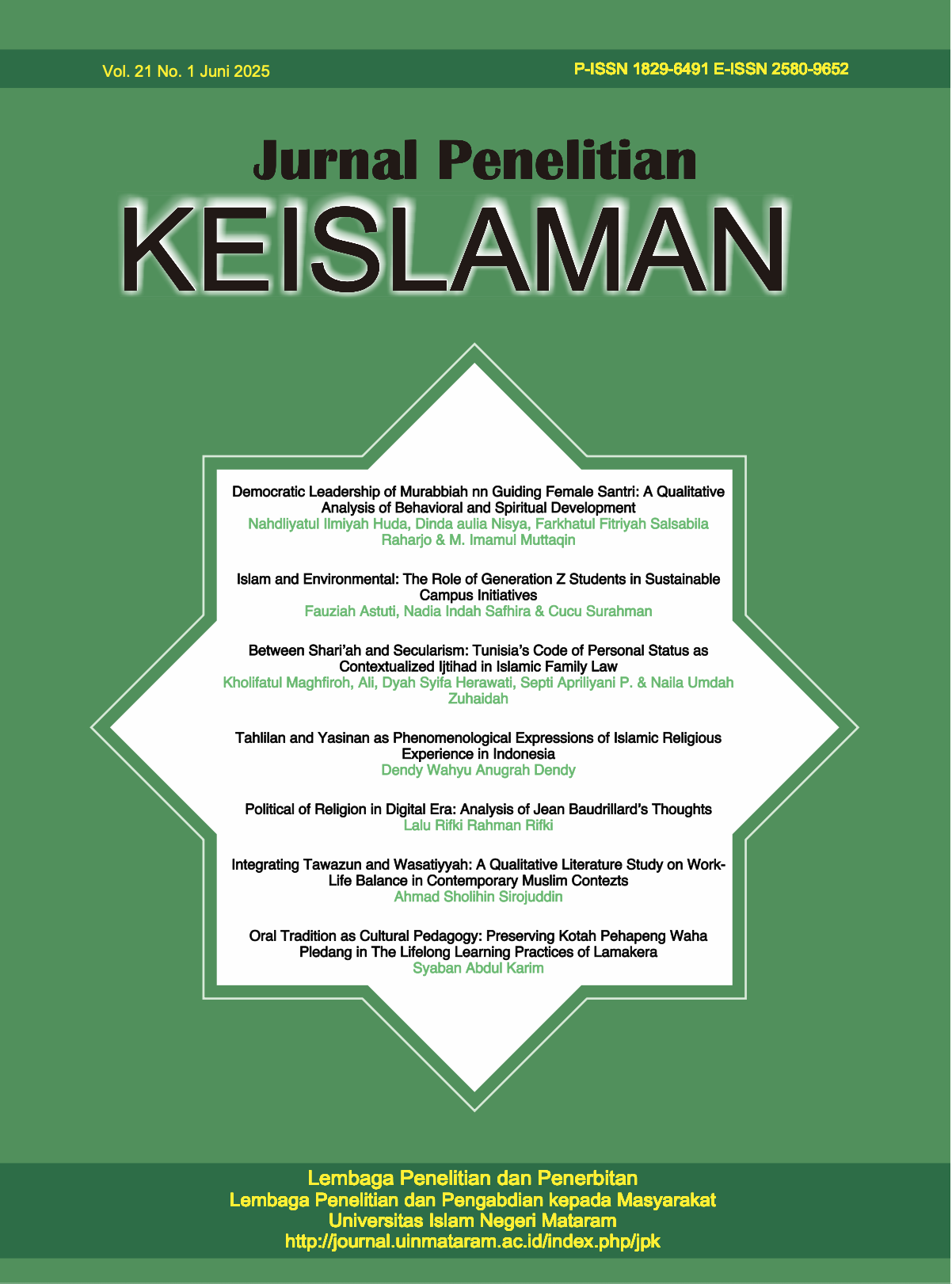Islam and Environmental
The Role of Generation Z Students in Sustainable Campus Initiatives
DOI:
https://doi.org/10.20414/jpk.v21i1.12215Keywords:
Islamic Environmental Ethics, Generation Z, Zero Waste, Environmental Stewardship, Sustainable Campus PracticesAbstract
Indonesia, as one of the world’s largest waste producers, faces significant environmental challenges stemming from inadequate waste management, threatening both ecological systems and public health. This study investigates the role of Muslim Generation Z students in adopting zero-waste practices at a university in Bandung, examining how Islamic ethical principles influence their environmental awareness, attitudes, and participation. The study employed a quantitative survey method using a Likert-scale questionnaire and analyzed data from 40 respondents through descriptive statistical techniques. Results indicate that Generation Z students possess relatively high environmental awareness and demonstrate a positive alignment between zero-waste principles and their religious values, particularly the Islamic concept of khilafah (stewardship). Nevertheless, significant barriers remain in fully adopting zero-waste practices, including insufficient campus infrastructure, limited practical knowledge, and sociocultural challenges. The study recommends enhancing facilities, developing targeted educational programs, and involving religious leaders to strengthen environmental ethics among students.
Downloads
References
Badan Pusat Statistik. “Jumlah Penduduk Menurut Wilayah, Klasifikasi Generasi, Dan Jenis Kelamin, Di INDONESIA - Dataset - Sensus Penduduk 2020 - Badan Pusat Statistik.” Sensus.bps.go.id. Last modified 2020. https://sensus.bps.go.id/topik/tabular/sp2020/2/0/0.
Firmansyah, Deri, and Dede. “Teknik Pengambilan Sampel Umum Dalam Metodologi Penelitian: Literature Review.” Jurnal Ilmiah Pendidikan Holistik (JIPH) 1, no. 2 (August 30, 2022): 85–114.
Jumarddin La Fua. “Eco-Pesantren; Model Pendidikan Berbasis Pelestarian Lingkungan.” Al-TA’DIB: Jurnal Kajian Ilmu Kependidikan 6, no. 1 (January 1, 2013): 113–125.
Harahap, R. Z. “Etika Islam dalam Mengelola Lingkungan Hidup.” EDUTECH: Jurnal Ilmu Pendidikan dan Ilmu Sosial 1, no. 1 (2015).
Hasnidar, S. “Pendidikan Estetika dan Karakter Peduli Lingkungan Sekolah.” Jurnal Serambi Ilmu 20, no. 1 (2019): 97–119.
Herdiansyah. “Eco-Pesantren as a Basic Forming of Environmental Moral and Theology.” Kalam 12, no. 2 (2018): 303–326. https://doi.org/10.24042/klm.v12i2.2834.
Iqbal, M., and T. Suheri. “Identifikasi Penerapan Konsep Zero Waste dan Circular Economy dalam Pengelolaan Sampah di Kampung Kota Kampung Cibunut, Kelurahan Kebon Pisang, Kota Bandung.” Jurnal Wilayah dan Kota 6, no. 2 (2019). https://doi.org/10.34010/jwk.v6i02.3191.
Karimuddin. Bab 1 Penelitian Kuantitatif. In Metodologi Penelitian Kuantitatif. Yayasan Penerbit Muhammad Zaini Anggota IKAPI, 2021.
Kasiram, Mohammad. Metode Penelitian Kuantitatif-Kualitatif. Malang: UIN Malang, 2008.
Mardliyah, W., S. Sunardi, and L. Agung. “Peran Manusia Sebagai Khalifah Allah di Muka Bumi: Perspektif Ekologis dalam Ajaran Islam.” Jurnal Penelitian 12, no. 2 (2018): 355–378.
Nurulloh, E. S. “Pendidikan Islam dan Pengembangan Kesadaran Lingkungan.” Jurnal Penelitian Pendidikan Islam 7, no. 2 (2019): 237. https://doi.org/10.36667/jppi.v7i2.366.
Rarasati, R., and T. Pradekso. “Pengaruh Terpaan Berita Satwa Laut yang Mati Akibat Sampah Plastik dan Kampanye Zero Waste terhadap Perilaku Pengurangan Penggunaan Kantong Plastik.” Interaksi Online 7, no. 4 (2019): 295–304.
Rustan, K., A. Agustang, and I. I. Idrus. “Penerapan Gaya Hidup Zero Waste sebagai Upaya Penyelamatan Lingkungan di Indonesia.” Sibatik Journal Jurnal Ilmiah Bidang Sosial Ekonomi Budaya Teknologi dan Pendidikan 2, no. 6 (2023): 1763–1768. https://doi.org/10.54443/sibatik.v2i6.887.
Sutoyo. “Revolusi Paradigma Perlindungan dan Pengelolaan Lingkungan Hidup di Indonesia.” Jurnal Pendidikan Pancasila dan Kewarganegaraan 28, no. 1 (2015): 56–66.
Syahroni, M. I. “Analisis Data Kuantitatif.” Jurnal Al-Musthafa 3, no. 3 (2023): 1–13. https://doi.org/10.62552/ejam.v3i3.64.
Syukriya, A. J., and L. R. Safitri. “Zero Waste Lifestyle Concept within Islamic-Science Perspective.” Journal of Halal Product and Research 4, no. 1 (2021): 32–42. https://doi.org/10.20473/jhpr.vol.4-issue.1.32-42.
Wardhana, A. “Instrumen Penelitian Kuantitatif dan Kualitatif.” In S. Bahri (Ed.), Metodologi Penelitian Kesehatan. Media Sains Indonesia, 2023.
Yasin, M., S. Garancang, and A. A. Hamzah. “Metode dan Instrumen Pengumpulan Data (Kualitatif dan Kuantitatif).” Journal of International Multidisciplinary Research 2, no. 3 (2024).
Downloads
Published
Issue
Section
License
Copyright (c) 2025 Fauziah Astuti, Nadia Indah Safhira, Cucu Surahman

This work is licensed under a Creative Commons Attribution-ShareAlike 4.0 International License.













